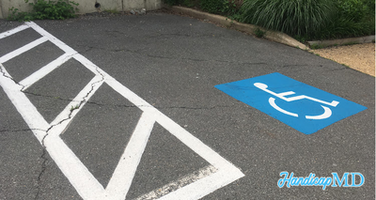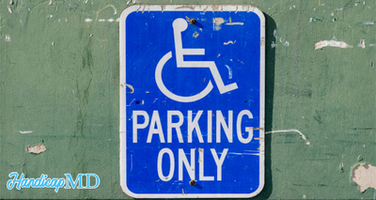
Unveiling the Rules and Regulations of Using a Handicap Placard in Rhode Island
Disability tags play a crucial role in ensuring that individuals with physical disabilities can park closer to buildings and access essential services with greater ease. In RI, the Department of Motor Vehicles (DMV) oversees the issuance of these tags, ensuring that those with qualifying disabilities receive the parking accommodations they need. However, using a disability tag comes with certain rules and regulations to prevent misuse and ensure that these parking privileges are reserved for those who truly need them.
In this comprehensive guide, we’ll unveil the rules and regulations of using a handicap placard in Rhode Island. From the eligibility criteria to proper usage and renewal processes, we’ll cover everything you need to know to stay compliant with state laws. Additionally, we’ll provide a section with frequently asked questions (FAQs) and a clear conclusion to summarize the key points.
Understanding the Purpose of a Handicap Placard in Rhode Island
What Is a Disability Tag?
A disability tag is a parking permit that grants individuals with qualifying disabilities access to designated accessible parking spaces, which are typically located closer to building entrances. These spaces provide more room for vehicles equipped with ramps or lifts and make it easier for individuals with mobility issues to enter and exit their vehicles.
In RI, a disability tag can come in the form of a placard (which is hung from the rearview mirror) or a disability license plate (which is affixed to the vehicle). Both options allow the user to park in spaces marked with the international symbol of accessibility.
Why Is Proper Usage Important?
Proper use of a disability tag is essential for maintaining the integrity of the system and ensuring that accessible parking spaces are available for individuals who genuinely need them. Misuse of a disability tag — such as allowing someone without a disability to use it or using an expired tag — can result in fines, penalties, and even the revocation of the tag.
Disability tags are designed to make life easier for individuals with disabilities by reducing the physical strain of navigating parking lots. By following the rules and regulations, tag holders can avoid legal consequences and help keep the system fair for everyone.
Eligibility Criteria for a Handicap Permit in Rhode Island
Permanent vs. Temporary Disabilities
There are two primary types of handicap permits available in RI:
- Permanent Disability Tags: Issued to individuals with long-term or permanent disabilities. These tags are renewable and need to be validated at the prescribed renewal intervals set by the state's DMV.
- Temporary Disability Tags: Issued to individuals with temporary disabilities or injuries that limit their mobility, such as post-surgical recovery or short-term conditions. Temporary tags have an expiration date, usually lasting from one to six months, depending on the individual’s medical condition and recommendation.
Both types of tags allow the user to park in accessible handicap parking spaces throughout the whole state and, in most cases, across the United States.
Medical Certification Requirements
To apply for a disability tag in RI, applicants must submit a completed form along with medical certification from a licensed healthcare provider. This certification confirms that the individual has a qualifying disability that significantly limits their mobility or ability to perform certain physical tasks.
The medical certification must specify the nature of the disability, its severity, and whether it is permanent or temporary. For temporary disabilities, the healthcare provider will estimate the duration of the condition, which determines the length of time the temporary tag is valid.
Examples of Qualifying Conditions
Individuals who have the following conditions may qualify for a disability tag in RI:
- Inability to walk 200 feet without stopping to rest.
- Severe lung disease or conditions that limit respiratory function, such as COPD or asthma.
- Use of portable oxygen or other assistive breathing devices.
- Severe cardiac conditions, such as those classified as Class III or IV by the New York Heart Association (NYHA), which limit physical activity.
- Loss or limited use of limbs (e.g., amputation or paralysis).
- Severe arthritis, musculoskeletal disorders, or neurological conditions that impair mobility.
- Legally blind or severely vision impaired individuals.
How to Apply for a Handicap Permit in Rhode Island
Application Process Overview
The process of applying for a Rhode Island handicap placard is simple but requires specific documentation to verify eligibility. Here are the key steps:
Download the Application: You can download the Disability Parking Placard/Plate Application (Form TR-3) from the state's DMV website.
Complete the Personal Information Section: Fill out your name, address, date of birth, and other personal details.
Obtain Medical Certification: Your healthcare provider must complete the medical certification section of the form, indicating the nature of your disability and whether it is temporary or permanent.
Submit the Application: Mail or deliver the completed application form to the state's DMV along with any required supporting documentation. There is no fee for obtaining a disability tag.
Once your application is processed, the DMV will mail your disability tag or license plates to you.
Required Documents and Fees
When applying for a disability tag, you’ll need to submit the following:
- A completed Disability Parking Placard/Plate Application form.
- Proof of identification, such as a Rhode Island driver’s license or state-issued ID.
- Medical certification from a licensed healthcare provider.
- For disability license plates, proof of vehicle registration is also required.
There are no fees for the initial application or for renewing a disability tag. However, if you are applying for disability license plates, regular vehicle registration fees apply.
Renewal Process for Handicap Placards in Rhode Island
For individuals holding a permanent disability tag, the state's DMV will typically notify the user when it’s time to renew. Here’s how to handle the renewal process:
Receive the Renewal Notice: The state's DMV sends out reminders for renewal, typically a few weeks before the tag expiration date.
Complete the Renewal Form: Renewal may involve completing a simplified renewal form. In some cases, a physician’s certification may be necessary to confirm the continued need for the disability tag.
Submit the Form: Return the renewal form to the DMV by mail or in person. For temporary tags, a new application and medical certification are usually required.
Receive Updated Tag: Upon processing, the DMV will issue a renewed tag with updated validity dates.
Rules and Regulations for Using a Handicap Placard in Rhode Island
Using a disability tag comes with certain responsibilities, and proper usage is essential to avoid penalties. In RI, the following guidelines outline the correct way to use and display your handicap placard:
Placement: When using a disability tag in RI, it must be hung from the rearview mirror of the vehicle while parked. The tag must be visible from outside the vehicle, with the front side (which displays the expiration date and permit number) facing outward. For those with disability license plates, the plates must be affixed to the front and rear of the vehicle just like standard license plates.
Only for Tag Holder’s Use: The tag is exclusively for the use of the individual with the disability. It is not transferable to others, and lending the tag for use by someone else is considered misuse. You can use your disability tag in any vehicle you’re driving or riding in, as long as the person with the disability is present. However, the tag cannot be used by someone else if you’re not in the vehicle.
Park Only in Designated Spaces: Disability tags grant access to designated parking spaces marked with the wheelchair symbol. However, these tags do not allow users to park in spaces marked for other specific uses, such as loading zones, fire lanes, or reserved spots that do not specifically include disability access. These spaces are typically located near building entrances and provide extra room for individuals who use wheelchairs or other mobility devices.
Expiration: Make sure to keep track of your tag’s expiration date and renew it promptly. Using an expired tag is prohibited and can lead to fines.
Out-of-State Use: RI disability tags are recognized in most states, allowing travelers with disabilities to utilize accessible parking spaces while visiting. However, it is recommended to check for any specific state laws or local regulations before traveling.
Penalties for Misuse and Violations
Improper use of a disability tag is taken seriously in RI, and penalties apply to individuals found violating regulations. Common violations include:
Using a Disability Tag Without Authorization: Only individuals with disabilities or those transporting them should use the disability tag. Unauthorized use of a tag by family members or friends without the disabled individual present can lead to fines and potential confiscation of the tag.
Using an Expired or Invalid Tag: Expired or counterfeit disability tags are considered invalid. Attempting to use an expired tag in an accessible parking space is punishable by fines, as is the use of fake or altered tags.
Parking in Restricted Areas: Disability tags only apply to spaces marked with the accessible parking symbol. Parking in restricted zones or areas marked for other uses, such as fire lanes, is not permitted.
Violations of disability tag regulations may result in fines, revocation of the tag, and possible additional penalties depending on the severity of the offense.
Avoiding Misuse and Penalties
Using a disability tag inappropriately can lead to fines, penalties, and the possible loss of your parking privileges. Common forms of misuse include:
- Allowing someone else to use your tag without you being present. The tag is issued to an individual, not the vehicle, so it can only be used when the permit holder is driving or riding as a passenger.
- Parking in non-designated spaces. The tag only permits parking in marked accessible spaces. Parking in restricted areas, such as fire lanes or loading zones, is illegal.
- Using an expired or damaged tag. Make sure your tag is up to date and not damaged. If your tag expires or becomes unreadable, you must apply for a replacement.
- Failure to display the tag properly. If the tag is not clearly visible, you may be fined for parking in an accessible space without a valid tag.
Penalties for misuse of a disability tag in RI can include fines ranging from $100 to $500, depending on the severity of the violation. Repeat offenses may lead to more significant penalties.
Traveling with a Rhode Island Disability Tag
If you plan to travel outside of RI, your disability tag is valid in other states under the Americans with Disabilities Act (ADA). This means you can use it to park in accessible spaces throughout the U.S. However, local parking regulations, such as time limits or fees, may vary, so it’s essential to check the rules in the state or city you’re visiting.
Renewing or Replacing a isabled Permit in Rhode Island
Renewal Process for Permanent and Temporary Tags
Permanent Disability Tags: These are valid for two years and can be renewed without the need for new medical certification unless your condition has changed. The state's DMV typically sends a renewal notice before the expiration date.
Temporary Disability Tags: These are valid for up to six months. If you need the tag for a longer period, you will need to submit a new application with updated medical certification.
To renew your disability tag, complete the renewal section of the Disability Parking Placard/Plate Application form and submit it to the Rhode Island DMV.
Replacing a Lost, Stolen, or Damaged Tag
If your disability tag is lost, stolen, or damaged, you must apply for a replacement by completing the same application form and indicating that you are requesting a replacement. There is no fee for replacing a lost or stolen tag.
If the tag was stolen, it’s a good idea to report the theft to local law enforcement and provide a copy of the police report when applying for a replacement.
Frequently Asked Questions (FAQs)
1. Can I use my RI disability tag in other states?
Yes, your RI disability tag is recognized in all U.S. states under the ADA. You can use it to park in designated accessible spaces while traveling, but be sure to follow local parking regulations regarding time limits and fees.
2. What should I do if my disability tag expires?
If your disability tag expires, you must renew it by submitting a renewal application to the state's DMV. For permanent tags, no new medical certification is needed unless your condition has changed. Temporary tags will require updated medical certification for renewal.
3. Can a family member or caregiver use my tag without me present?
No, it is illegal for someone else to use your disability tag if you are not in the vehicle. The tag is issued to the individual with the disability, and misuse can result in fines and penalties.
4. How long is a disability tag valid in RI?
- Permanent disability passes are valid for two years and must be renewed upon expiration.
- Temporary disability passes are valid for up to six months and can be renewed with updated medical certification.
5. Are there penalties for misusing a disability tag in RI?
Yes, misuse of a disability tag in RI can result in fines ranging from $100 to $500. Repeat offenders may face additional penalties, including the possible revocation of the tag.
6. How can I apply for a disability tag in RI?
You can apply for a disability tag by obtaining the required form from the state's DMV, having your physician complete the medical certification, and submitting the form to the DMV.
7. What should I do if my disability tag is lost or stolen?
Report the loss or theft to the state's DMV and follow their instructions for obtaining a replacement tag. You may be asked to complete a form and pay a replacement fee.
8. Can I use my disability tag in any parking space?
No, a disability tag is only valid for spaces marked with the accessible parking symbol. It does not allow parking in fire lanes, loading zones, or other restricted areas.
9. Can my disability tag be revoked?
Yes, disability tags can be revoked if the holder is found to be misusing the tag or no longer meets eligibility criteria. Revocation can occur due to violations or failure to renew.
10. Is there a limit to how many disability tags I can have?
In RI, individuals are generally allowed only one disability tag per person. This limit helps ensure that tags are used responsibly and only by those who need them.
Conclusion
Understanding and following the rules and regulations of using a handicap placard in Rhode Island is crucial for maintaining your parking privileges and ensuring accessible parking spaces remain available for those who need them. Whether you have a permanent or temporary disability, using your tag correctly—by displaying it properly, renewing it on time, and avoiding misuse—will help you avoid fines and penalties while benefiting from the accommodations provided by accessible parking.
If you meet the eligibility requirements for a disability tag in RI, the application process is simple and straightforward. Be sure to follow the guidelines outlined in this article, and consult with the state's DMV if you have any specific questions about your tag or license plates.
.png)






